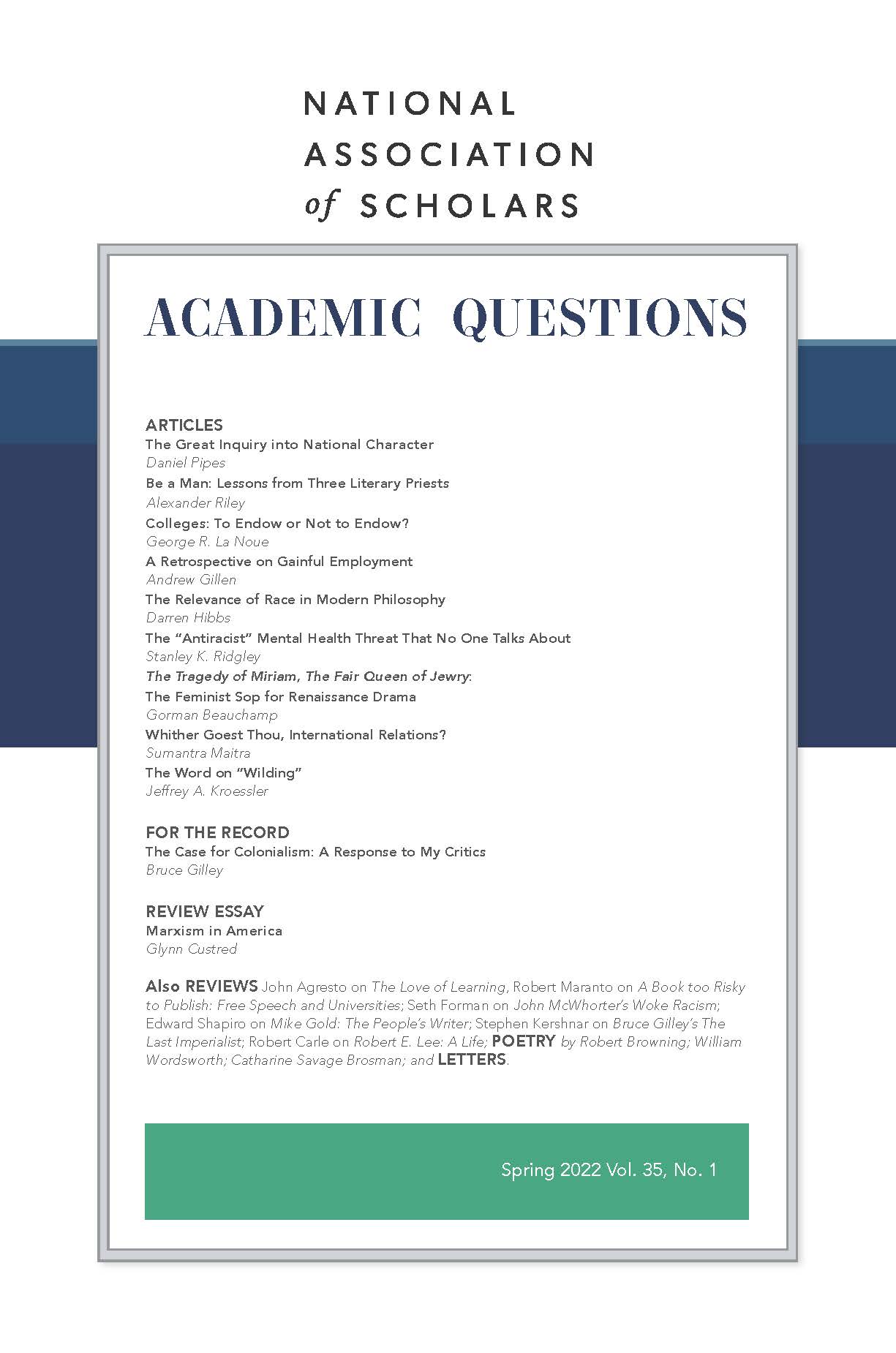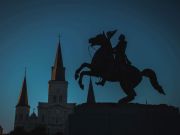Robert E. Lee: A Life, Allen Guelzo, Knopf, 2021, pp. 624, $35.00 hardcover.
Robert Carle is a professor of theology at The King’s College in Manhattan; [email protected]. Dr. Carle has contributed to the Wall Street Journal, The American Interest, Newsday, Society, Human Rights Review, The Public Discourse, Academic Questions, and Reason. He last appeared in AQ with “America’s First Female Doctors Changed the Practice of Medicine” in the Fall 2021 issue.
Allen Guelzo, America’s leading Civil War historian, began writing his biography of Robert E. Lee in 2014. In the seven years since Guelzo began his project, Lee has become a lightning rod in America’s culture wars. “It is as if I were building a bridge across a river, and when I was almost finished, the bank of the river receded,” Guelzo said in an interview. “I was writing B.C. Before Charlottesville.”
Since 2020, hundreds of Confederate monuments throughout the South have come tumbling down. Guelzo thought that his biography might encounter a similar fate, and he asked his editor, Andrew Miller, to put his manuscript on ice. Miller assured Guelzo that a thorough and mature biography of Lee is exactly what the country needs right now. We all owe a debt of gratitude to Guelzo’s editor. Robert E. Lee: A Life is a sympathetic and unflinching exploration of the wrenching context in which Lee betrayed the oath he took to his nation in order to fight for his home state and defend a slave system that he knew was morally repugnant.
Guelzo was reared in a Yankee household where he was “catechized at my grandmother’s knee in the righteousness of the Union war.” (3) Yet Guelzo was aware that even Robert E. Lee’s adversaries were awed by the man. Francis Charles Lawley, the London Times’s special correspondent in America, wrote of the “unconscious dignity of General Lee’s courage when he is under fire.” Abraham Lincoln called Lee “a noble, noble, brave man.” Ulysses S. Grant wrote that Lee was a man of “faultless form” and “much dignity.”
Guelzo’s biography echoes some of these sentiments, but Guelzo also finds cracks and inconsistencies in Lee’s stoic facade. Lee worried obsessively about money, even though he was a very rich man. When he resigned from the Union army, Lee made this remarkable plea to General Winfield Scott for understanding: “General, the property belonging to my children, all they possess, lies in Virginia. They will be ruined if they do not go with their State. I cannot raise my hand against my children.” (188)
During the 1850s, Lee opposed both slavery and secession. Lee wrote in 1856, “In this enlightened age, there are few, I believe, but what will acknowledge that slavery as an institution is a moral and political evil in any country.” (145) When the Southern states began separating from the Union, Lee told his father-in-law, “Secession is nothing but revolution.” Echoing the sentiments of Abraham Lincoln, Lee insisted that the Constitution was “intended for perpetual union, and for the establishment of a government, not a compact.” Secession was “anarchy and not a government.” (178) Lee was, nonetheless, inexorably drawn into following the lead of Virginia into the Civil War.
Lee was raised in “one of the more remarkably dysfunctional families of the early republic.” (5) Henry Lee, Lee’s father, served George Washington so skillfully as a cavalry officer that he won the nickname “Light-Horse Harry.” Soon after the war, Light Horse Harry’s life disintegrated. He pursued reckless land-speculation schemes that bankrupted him. He married into prominent Virginia families, but he burned through his wives’ cash. When Robert was six, his father fled to the West Indies. Robert never saw his father again.
Robert eventually became the de facto head of household in Alexandria. He carried the keys, attended to the marketing, and became his mother’s agent and confidential messenger. He would fulfill the role that his father had abandoned; he would sacrifice himself to compensate for the sins of his father. Seeking a secure life, Lee enrolled in West Point. For the small cadre of officers in pre-Civil War America, the army was one of the few professions that guaranteed a lifelong salary.
At West Point, education focused on the emerging profession of civil engineering—the management of roadways, irrigation, drainage, flood control, tunnels, and canals. Lee graduated second in his class. Guelzo writes that Lee was never happier than when he was working in the Army’s Corps of Engineers with “a draftsman’s notebook in his hands.”
When the Civil War erupted, Lee’s desire for security prompted him to join the Confederate cause in spite of his philosophical reservations about slavery and secession. He thought that a Confederate invasion of the North would force Lincoln to the negotiating table and achieve a quick victory. This may have happened had Lee won at Gettysburg.
There is no evidence that Lee participated in the worst atrocities committed by the Confederacy (the murder of Black POWs or the kidnapping and selling into slavery of free Pennsylvania blacks), but there is no evidence that he opposed these atrocities either. Robert E. Lee was no Hitler, but like the Germans of the 1930s and 1940s, Lee was always looking and looking away at the same time.
Guelzo rightly sees Appomattox as a defining moment in American history. Lee arrived at the Appomattox farmhouse in a crisp new uniform, carrying George Washington’s sword, to surrender his army and to renounce his cause. The Confederacy was clearly lost, and Grant and Lee had a duty to shift from themselves “the responsibility of any further effusion of blood.”
Grant received the surrender of the Army of Northern Virginia, but he immediately paroled all who surrendered there. There would be no triumphal parades and no trials. There would be no humiliating relinquishing of weapons as tokens of defeat. All officers were to keep their sidearms. At Lee’s suggestion, Grant allowed Confederate soldiers to take home an army horse or mule for planting “a spring crop.”
Lee’s officers urged him to send his soldiers into the mountains to wage a guerilla war, but Lee would have none of it. “The surrender of the army is the end of the Confederacy,” Lee said. Lee told his soldiers, “Go to your homes and resume your occupations. Obey the laws and become as good citizens as you were soldiers.” In the distance, Union artillery men began firing a celebratory salute, and Grant ordered them silenced. “The war is over, the rebels are our countrymen again, and the best sign of rejoicing after victory will be to abstain from all demonstrations in the field.” (362) Walt Whitman saw in Appomattox something “paralleled nowhere in the world” because “in any other country on the globe the whole batch of Confederate leaders would have had their heads cut off.” (434)
Lee's comrades in arms did not all follow his path to surrender and reconciliation. Jubal Early moved to Mexico, where he hoped to carry on the Civil War with guerrilla-warfare attacks on the United States. Nathan Bedford Forrest became the first Grand Dragon of the Ku Klux Klan. John Brown Gordon followed Forrest as Grand Dragon after Forrest’s health failed. After the war, Lee did not adopt the violent terrorism of so many of his contemporaries. For this, Lee has received faint praise, but Guelzo reminds us that “comparative harmlessness is not much of a historically significant quality.”
In the summer of 1865, the trustees of Washington College in Lynchburg invited Lee to assume the presidency of the College. The trustees anticipated that Lee would be a figurehead, but Lee threw all his energies into his new position. He sidelined the traditional studies of Greek and Latin and transformed the college into a center of commercial, agricultural, and technical learning. Lee went North to cultivate donors for his new ventures. He even held a fundraising event at Cooper Union, where Lincoln had launched his bid for the Republican presidential nomination in 1860. Abolitionists like George Peabody and Henry Ward Beecher donated generously to Washington College. Lee turned the bankrupt institution into an elite national powerhouse with a sizable endowment. When Lee assumed the presidency, Washington College had seventeen students. In June 1867, Lee announced that the student body had grown to 399, with 37 students from the North, including Pennsylvania, Massachusetts, and New Jersey.
The challenge for Guelzo is to balance any acknowledgment of Lee’s achievements with the overriding fact of Lee’s crimes. Lee betrayed the oath he took at West Point to “honestly and faithfully defend the United States of America . . . against all their enemies or opposers,” and to “observe and obey the orders of the President of the United States.”
In spite of Lee’s reservations about slavery, he fought to perpetuate the institution. On at least one occasion, Lee ordered the constable to whip slaves who had run away from his father-in-law’s estate. When Washington College’s fund-raising officer advised Lee that admitting black students to Washington College would open Northern donor pocketbooks, Lee soundly rebuked him.
A biographer develops an intimate relationship with his subject’s struggles, losses, and sorrows. The risk for the biographer is that sympathy for his subject can obscure moral clarity and historical judgments. Guelzo does not have that problem. His achievement is that he succeeds in gazing fearlessly at Lee’s failings while at the same time developing a compassionate understanding of the psychic forces that shaped his deeply flawed subject.
Photo by Stephanie King on Unsplash













